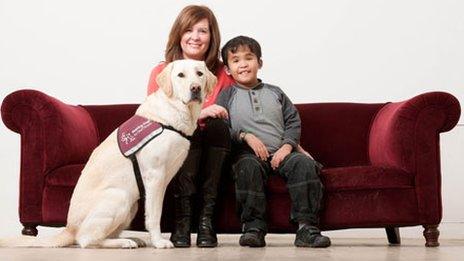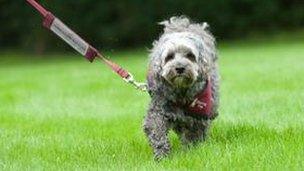Hearing dogs are changing deaf children's lives
- Published

Kurt has given James much-needed confidence and a love of dogs
Dogs are commonly known as man's best friend, but it turns out they may also be a child's - particularly if those children are one of the 45,000 deaf children in the UK.
"Hearing dogs", as they are known, could transform many young lives by offering companionship, confidence and independence.
Not only that, but these specially trained dogs could improve behaviour at school and lead to better academic performance, a recent study has found.
James Cheung is 11 years old and the owner of Kurt, a golden labrador retriever.
Kurt is specially trained to respond to household sounds that a deaf child cannot hear, like a door bell ringing, a telephone sounding and any alarms going off in the home.
But Kurt has proved to be much more than just a dog who hears.
"He is a wonderful accompaniment to our household," say James's mother Louise, from Derbyshire.
"I can't remember life without him."
Sleep companion
Although they have had Kurt for less than a year, he has become a close companion for James, who is an only child, and a reassuring presence around the home.
"James had sleep anxieties, which he was being treated for, but now that Kurt sleeps with him in his bedroom he feels much less isolated when he takes out his hearing aid at night."
Kurt has also helped James' social interaction, which he had always found difficult because of a speech disability.
"James is now mad keen on dogs, even his teachers have noticed. He researches them and talks about them. It's an interest which helps him initiate conversation with people.

Hearing dogs can be recognised by their burgundy jacket and lead
"Before he would have avoided dogs. Now he adores them."
The study, carried out by Hearing Dogs for Deaf People, looked at the impact of hearing dogs on the lives of 12 deaf children and their hearing families in the UK since 2008.
It found that hearing dogs had a positive effect in a number of areas, such as helping parents get the child's attention, making bedtime and sleeping easier, and giving the child confidence - particularly in social settings.
Parental concerns about the child's safety also fell dramatically, the study found.
Reassurance
Michele Jennings, chief executive of the charity, says this is because they can feel more relaxed about everything.
"Parents are concerned about dangers around the home but we train dogs to respond to smoke alarms, to alert a child to alarming noises, even things like ambulance sirens when they are out and about.
The responses of the families involved in the study said the dogs helped the children stay safe near roads and prevented them wandering off in public places.
But there were other noticeable benefits to placing hearing dogs with deaf children.
Their teachers noticed better behaviour at school and parents experienced happier family times at home.
The child was also more likely to wear a hearing aid, which often led to better academic progress and improved speech.
Most importantly, the dogs became their friends - often "best friends".
Hearing dogs are trained to alert children by nudging the child with their nose or, in the case of an alarm clock, wake the child up by putting two paws on the bed and pulling the duvet off.

Hearing dogs are socialised initially in volunteer families when they are puppies
Loving bond
Hearing dogs can also be used by the parent to fetch the child when needed and to carry written messages in a small purse, which the child can then respond to in the same way.
"The dog is a great conduit between parent and child - it gives the child independence," Michele Jennings says.
The majority of the dogs trained by the charity are cocker spaniels, miniature poodles, labradors and golden retrievers - dogs that can cope in most situations and be obedient, loving family dogs.
Volunteers offer to socialise the dogs when they are puppies, and when they are 10 or 11 months old, they start their sound skills training.
They are then introduced to a recipient deaf child and the bonding starts to take place.
There are currently 750 working hearing dogs in the UK for adults and, following the success of the trial, the charity wants to train many more dogs to work with deaf children.
It's a costly process though, with each dog costing £45,000 to be trained during its lifetime.
All hearing dogs are retired at 11 years of age but they are usually kept on by the families.
"The bond between family and dog and child and hearing dog is so strong. It's a joy to see. They just become part of the family," says Ms Jennings.
- Published6 February 2012
- Published26 May 2011
- Published23 January 2012